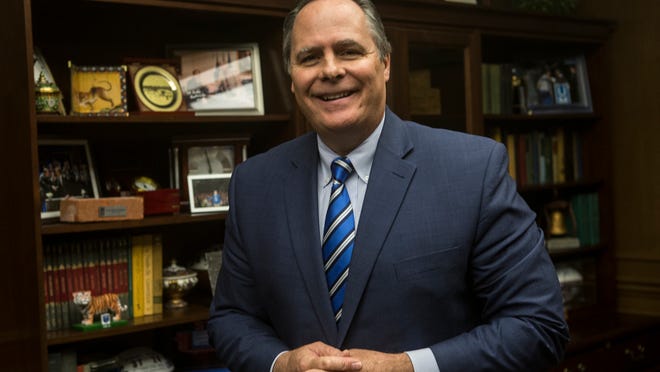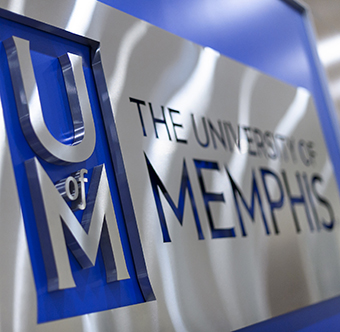Although most Memphians are focused on whether the University of Memphis will make it into the NCAA tournament, U of M has in fact already won the academic equivalent of the championship.
In fact, this academic big win will have more long-term importance than any sports victory.
It happened when the university achieved its long-time goal of becoming a Carnegie R-1 institution, which is a significant boost to University of Memphis’ reputation and standing. It also puts the lie to the stale derogatory nickname that has greeted U of M’s sports teams, replacing it with its new aspirations: “Tiger Sky High.”
With the presidency of David Rudd coming to a close in three months, there is no argument that the R-1 designation is the climax of his eight years as president although several other important milestones were achieved.
The Power of More Autonomy
 Community attitude toward the Rudd years is overwhelmingly favorable and it has helped to position the University of Memphis more strongly and ambitiously in Memphis and Shelby County. Then, too, that stronger presence relates directly to the creation in 2016 of an independent board of trustees with local control and autonomy.
Community attitude toward the Rudd years is overwhelmingly favorable and it has helped to position the University of Memphis more strongly and ambitiously in Memphis and Shelby County. Then, too, that stronger presence relates directly to the creation in 2016 of an independent board of trustees with local control and autonomy.
The board of trustees is comprised of the usual suspects, which is who sits on similar university boards across the U.S. While they are often not representative of the broader community, the priority is to appoint people with financial resources to support the university and the political and civic influence to achieve the university’s ambitions.
In fact, this kind of influence was essential to the development of a more independent University of Memphis in the first place. The risk for these types of appointments is that trustees can serve too many masters which can result in competing pressures and loyalties. In addition, they run the risk of being insulated from the community they serve and lacking connections to the grassroot leaders whose support is important to the university standing in the city and county.
Since the board of trustees was confirmed in 2017, the partnership between the board and President Rudd have produced a record era of new construction and state and private funding. A year later, university leaders set the attainment of R-1 as a top priority. When the university was under the control of the Tennessee Board of Regents, it did not have final authority over its own priorities and operations.
As a result, R-1 was treated as something good to pursue, but with the full authority of its own board of trustees, University of Memphis no longer had to ask for permission. It had the power to put the full weight of the university – president, faculty, trustees, and alumni – behind it, and what was predicted by consultants to take 10 to 20 years became a reality in three.
The Major Leagues
There are 4,000 colleges and university in the United States, but only 146 have achieved R-1 status. In Tennessee, there are only three – University of Tennessee at Knoxville, Vanderbilt University, and now, University of Memphis.
The official description of a R-1 institution is as a doctoral university with “very high research activity.” University of Memphis received $50.23 million in research grants in FY2021, up from $31.86 million only three years before when it was R-2.
University of Memphis: Aiming for a Competitive Future, December 31, 2019
Armed with the new research designation, the university should be able to recruit elite academic stars and researchers, it should be able to attract even more research grants, it should register more patents, and it should attract more corporate investments.
Best of all, it will be a vital cog in a missing ecosystem that could help Memphis transition from a logistics-heavy economy to one built on knowledge and research.
U of M estimates that the economic impact of the R-! designation could be $218 million each year and 1,550 jobs.
Building Boom
It’s always been a point of frustration that the University of Memphis has not been ranked by U.S. News and World Report as a top-tier university. After President Rudd set it as a priority, it was reached in 2019.
Other areas of focus also resulted in progress. The retention of first year students reached more than 80%, the graduation rate increased by about 25%, creation of the U of M Research Foundation (UMRF) to employ students in better-paying jobs.
In a city proud of the level of construction under way, the university has led the way with $178 million – from the $18.5 million pedestrian cable bridge to the $31 million student wellness center, from $40 million for the new music center to $12 million for an aquatics center, from $21 million for the basketball center to $41 million for a STEM building, and from the $3.5 million field house facelift to the $5 million in a town-gown partnership for a $24 million tennis center.
University of Memphis: Disrupting Expectations, October 24, 2019
All the progress does not mean that there have not been criticisms or complaints. There have been concerns by Black students that their voices aren’t fully heard although they make up one-third of the enrollment and some complaints from faculty along the same lines. A faculty member at the law school asserted racism in hiring practices. The dean of the business school left after two years to return to Southern California.
The gutting of the Sparks Bureau for Business and Economic Research, which had been an objective source about the economy for decades, was devastating to those of us who valued reliable and authoritative data and economic impact studies that weren’t written to suit the interests of the persons paying for them. The Sparks Bureau was headed by Dr. John E. Gnuschke, a highly respected expert and researcher, known for his truth-telling.
Meanwhile, the Public Safety Institute at the university lacks the academic rigor or objectivity that are needed for it to be a source of innovative thinking about breakthrough ideas about policing and crimefighting in Memphis. With the Memphis Shelby Crime Commission as its appendage, its emphasis on doing the same and expecting different results inhibits the kind of progressive solutions the city deserves.
The Hardgrave Era
A new era begins in May when Dr. Bill Hardgrave, now provost and senior vice-president for academic affairs at Auburn University, becomes the 13th president of the University of Memphis. Every university administration takes on the character of its president, and we’re unsure at this point what his will be. He faces the challenge of building on the current momentum and expanding the university’s involvement in critical policy matters and grassroots initiatives, which has diminished in recent years after professors were actively involved in neighborhood improvement and revitalization programs. He also will have to prove that has the ability to manage a campus much more diverse than the one he comes from.
Meanwhile, local government makes too little use of the academic expertise present and available at the University of Memphis. Plans, particularly economic development ones, are regularly drawn up without input from economists, transportation experts, technologists, and more. It is an attitude that squanders the questioning and objective data that are inherent in the academic environment and which could bring value to civic priority-setting and planning.
In many cities – think Boston – civic challenges are tackled by academic think tanks and the absence of this leading edge critical thinking often shows in plans here.
For too many years, University of Memphis has been taken for granted, but in today’s context of regional population decline, sluggish jobs growth, and one of the lowest percentage of creative workers in the U.S., the university has never been more important.
Ultimately, it is a defining force in whether our region’s economic indicators improve. Most of all, as the largest higher education institution in this part of the country, the University of Memphis is our single greatest talent generator.
*****
Join us at the Smart City Memphis Facebook page and on Instagram for blog posts, articles, and reports relevant to Memphis.





I joined the faculty in the business college way back in 1973. The University still had the feel of a ‘normal school.” It was just feeling its way into University status. Its strong suite was teaching — an emphasis that I hope the University never loses. But it took may years and many dedicated administrators and faculty to move the University to its position of today. And part of the problem was that the University was effectively controlled and limited by Nashville. Another problem was the lack of interest on the part of the local community in the University. But that changed over time — as many worked to build the research capability of the University and to focus some of that research towards the needs of the Memphis community. Like the article above, one of the great losses to the University in recent times was the closing of the Bureau of Business and Economic Research in the business school. But other things will replace it over time. UM has a great future before it.